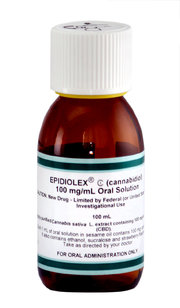GW Pharmaceuticals plc (Nasdaq:GWPH), along with its U.S. subsidiary Greenwich Biosciences, announced today that the U.S. Food and Drug Administration (FDA) has approved EPIDIOLEX® (cannabidiol) oral solution for the treatment of seizures associated with Lennox-Gastaut syndrome (LGS) or Dravet syndrome in patients two years of age or older. EPIDIOLEX is the first prescription pharmaceutical formulation of highly-purified, plant-derived cannabidiol (CBD), a cannabinoid lacking the high associated with marijuana, and the first in a new category of anti-epileptic drugs (AEDs). Product availability is pending rescheduling which is expected to occur within 90 days.
“Today’s approval of EPIDIOLEX is a historic milestone, offering patients and their families the first and only FDA-approved CBD medicine to treat two severe, childhood-onset epilepsies,” said Justin Gover, GW’s Chief Executive Officer. “This approval is the culmination of GW’s many years of partnership with patients, their families, and physicians in the epilepsy community to develop a much needed, novel medicine. These patients deserve and will soon have access to a cannabinoid medicine that has been thoroughly studied in clinical trials, manufactured to assure quality and consistency, and available by prescription under a physician’s care.”
LGS and Dravet syndrome, which develop in childhood, are rare, severe forms of epilepsy that are notoriously treatment-resistant.1,2 Most patients with LGS and Dravet syndrome require multiple seizure medications and the majority are resistant to currently approved AEDs.2,3,4 The day-to-day impact of these conditions is significant with high rates of early mortality.5,6
“In my practice, I often see patients with these highly treatment-resistant epilepsies who have tried and failed existing therapies and are asking about CBD,” said Orrin Devinsky, M.D., of NYU Langone Health’s Comprehensive Epilepsy Center and a lead investigator in the EPIDIOLEX clinical program. “I am delighted that my physician colleagues and I will now have the option of a prescription cannabidiol that has undergone the rigor of controlled trials and been approved by the FDA to treat both children and adults.”
“LGS and Dravet syndrome are two of the most severe and difficult-to-treat forms of childhood-onset epilepsy. These children and their families face a long and challenging road and very few achieve adequate seizure control,” said Elizabeth Thiele, M.D., director of the pediatric epilepsy program at Massachusetts General Hospital, professor of neurology at Harvard Medical School and a lead investigator in the EPIDIOLEX clinical program. “Based on numerous clinical trials, this medication may help meet the need for this specific pediatric patient population and is now the first to be approved by the FDA in Dravet syndrome.”
The EPIDIOLEX clinical development program included three randomized, controlled Phase 3 clinical trials and an open-label extension study. In the Phase 3 studies, published in The New England Journal of Medicine7,8 and Lancet9, EPIDIOLEX added to other antiepileptic therapies significantly reduced the frequency of seizures in patients with LGS and Dravet syndrome. The most common adverse reactions that occurred in EPIDIOLEX-treated patients were somnolence; decreased appetite; diarrhea; transaminase elevations; fatigue, malaise, and asthenia; rash; insomnia, sleep disorder and poor quality sleep; and infections. The company’s development program represents the only well-controlled clinical evaluation of a cannabinoid medication for patients with LGS and Dravet syndrome.
“For those living with intractable seizures caused by LGS and Dravet syndrome, EPIDIOLEX represents a true medical advancement,” said Philip Gattone, president and CEO of the Epilepsy Foundation. “Clinical development for these rare and severe conditions is essential, and today’s news brings hope for these patients and their families that a new treatment option may have the potential to help better control their seizures.”
EPIDIOLEX will be marketed in the U.S. by Greenwich Biosciences, the U.S. subsidiary of GW Pharmaceuticals plc. As part of the approval process, EPIDIOLEX must be rescheduled from its current Schedule I before it can be made available to patients. Rescheduling is expected to occur within 90 days. Access is expected to be similar to other branded AEDs and EPIDIOLEX is expected to be available to appropriate patients by Fall 2018. More information can be found at Epidiolex.com.
Outside the U.S., this medicine is currently under review by the European Medicines Agency (EMA) for the treatment of seizures associated with LGS and Dravet Syndrome. An EMA decision on whether to recommend approval is expected in the first quarter of 2019.
For more information on Dravet syndrome and Lennox-Gastaut syndrome, including community support, please visit the Dravet Syndrome Foundation at www.dravetfoundation.org and the Lennox-Gastaut Syndrome Foundation at www.lgsfoundation.org.
About GW Pharmaceuticals plc and Greenwich Biosciences, Inc.
Founded in 1998, GW is a biopharmaceutical company focused on discovering, developing and commercializing novel therapeutics from its proprietary cannabinoid product platform in a broad range of disease areas. GW, along with its U.S. subsidiary Greenwich Biosciences, has received U.S. FDA approval for EPIDIOLEX (cannabidiol) oral solution for the treatment of seizures associated with Lennox-Gastaut syndrome (LGS) or Dravet syndrome in patients two years of age or older, pending DEA rescheduling. The Company has submitted a regulatory application in Europe for the adjunctive treatment of LGS and Dravet syndrome. The company continues to evaluate EPIDIOLEX in additional rare epilepsy conditions and currently has ongoing clinical trials in tuberous sclerosis complex (TSC) and infantile spasms (IS). GW commercialized the world’s first plant-derived cannabinoid prescription drug, Sativex® (nabiximols), which is approved for the treatment of spasticity due to multiple sclerosis in numerous countries outside the United States and for which the company is now planning a U.S. Phase 3 trial. The Company has a deep pipeline of additional cannabinoid product candidates which includes compounds in Phase 1 and 2 trials for epilepsy, glioblastoma, and schizophrenia. For further information, please visit www.gwpharm.com.
1LGS Foundation. About Lennox-Gastaut Syndrome. Available at http://www.lgsfoundation.org/aboutlgs. Accessed May 7, 2018.
2 Dravet C. The core Dravet syndrome phenotype. Epilepsia. 2011;52(Suppl. 2):3–9.
3Epilepsy Foundation. Lennox-Gastaut Syndrome. Available at http://www.epilepsy.com/learn/types-epilepsy-syndromes/lennox-gastaut-syndrome-lgs. Accessed May 7, 2018.
4Epilepsy Foundation. Dravet syndrome. Available at https://www.epilepsy.com/learn/types-epilepsy-syndromes/dravet-syndrome. Accessed May 7, 2018.
5 Cooper MS, Mcintosh A, Crompton DE, et al. Mortality in Dravet syndrome. Epilepsy Res. 2016;128:43-47.
6 Trevathan, E. Infantile Spasms and Lennox-Gastaut Syndrome. Journal of child neurology 17, 2S9-2S22 (2002).
7 Devinsky O, Cross JH, Laux L, et al. Trial of cannabidiol for drug-resistant seizures in the Dravet syndrome. N Engl J Med 2017;376;2011-20.
8 Devinsky O, Patel AD, Cross JH, et al. Effect of Cannabidiol on Drop Seizures in the Lennox–Gastaut Syndrome. N Engl J Med 2018;378;20:1888-97.
9 Thiele EA, Marsh ED, French JA, et al. Cannabidiol in patients with seizures associated with Lennox-Gastaut syndrome (GWPCARE4): a randomized, double-blind placebo-controlled phase 3 trial. Published online January 24, 2018http://dx.doi.org/10.1016/S0140-6736(18)30136-3.





